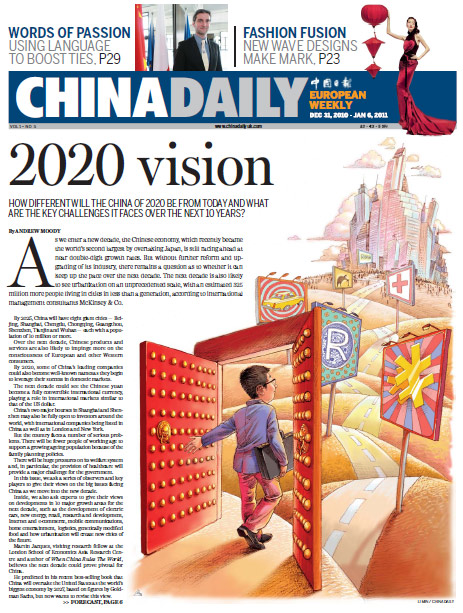Chinese celebrating Christmas holiday
Updated: 2010-12-24 10:33
By Liu Lu (China Daily European Weekly)
On the streets nearby, rose and chocolate peddlers are vying for their business.
Christmas has become another Valentine's Day (another imported holiday), and at the same time, more people feel it is a time to reward themselves with good food and a good time.
Shen Liping, 23, a postgraduate student of social sciences at Renmin University of China in Beijing, is planning a big dinner and later a karaoke singing session with her classmates on Christmas Eve.
She thinks it is a good opportunity to relax from the stress of China's fast-paced, modern life, even though there are no days off. Luckily for her, Christmas Eve this year falls on a Friday.
"People now are busy with their studies or work. Christmas just gives us a good excuse for a little self-pampering," she says.
When Shen arrived in Beijing four years ago, her first Christmas celebration made a strong, lasting impression. In her hometown, which is a small village in East China's Fujian province, her neighbors and family friends have no idea about any foreign holidays. And that is still the case outside China's cities.
For ordinary people like Shen, Christmas is a fun time but for Chinese business people it is a time to make money and cash in on the new-found Christmas spirit.
Smart retailers are also taking advantage of the festival to boost sales.
To lure customers, upscale restaurants serve romantic candlelight dinners and luxury hotels offer package services at bargain prices. Lucky door prizes are very popular.
"I'm more in love with Christmas, because it's when I can buy things with the biggest discount," says a woman surnamed Fang, a foreign enterprise employee.
"But it's also the time men spend big bucks," Fang's husband interrupted and grinned.
"Women are driven crazy by Christmas sales and promotions at almost all department stores."
In the cities, modern retailers have been joined by big-name traditional stores in a battle to win the Christmas-inspired customers.
"If one can enjoy a happy Christmas dinner, who cares if they are eating turkey or Beijing roast duck?" says Zhang Hong, a chain store manager of Quanjude Peking Roast Duck Restaurant in Beijing.
She says her company has attached great importance to promotions on popular Western festivals in recent years to meet the changing demands and tastes of their guests.
This year is no exception and the famous restaurant will serve customers a special Christmas Eve festival menu, which is a fusion of Chinese and Western-style food.
"Foreigners are sure to have an impressive duck banquet on Christmas Eve served by waitress dressed in qipao but wearing a Christmas hat," she says.
Santa Claus is also getting busy in China this year. The "official" St. Nicholas has officially added China to his itinerary for the first time.
A group of 11 registered Santas will travel all the way from Father Christmas's hometown of Rovaniemi in Finland to greet and spread holiday joy on Christmas Eve. The group will spread across 11 cities in China, including Shanghai and Guangzhou.
Stefan Wallin, Finland's Minister for Culture and Sports, said at a press conference on Nov 23 in Beijing that his nation wanted more Chinese to experience the authentic Christmas atmosphere.
And who better to help than a team of Finnish Santa Clauses.
However, as more Chinese join in the Christmas celebrations each year, some feel the Western-based festival is harming time-honored traditions.
They fear that passion toward traditional Chinese holidays, particularly among young people, will slowly fade out.
But Cai considers it is unnecessary to boycott a Western cultural festival.
"All important festivals in different cultures have now developed into universal holidays," he says.
"Just like some Europeans celebrate Spring Festival nowadays, it's no wonder that Chinese celebrate Christmas.
"As a matter of fact, Chinese culture has developed a lot while embracing cultures from others."
But he says although Western cultures and festivals have entered people's daily lives, many Chinese still need to learn more about their backgrounds and the deeper meanings behind their celebration activities and not just blindly copy something they do not understand.
Paper's Digest

Convertible yuan
The yuan is likely to be fully convertible and on the way to being one of the world's major currencies by 2020.
Fight against inflation
Words of passion
Euro vision
Specials

Internet aids luxury sales
More sophisticated Chinese consumers are surfing for luxury products on the Internet and a number of branded labels are ready to ride the wave.

Tobacco controls
An anti-smoking watchdog has criticized Chinese authorities for "making little progress" on enforcing tobacco controls.

Godfather of yachts
Traugott Kaminski claims he was the first person to bring the yacht culture to China seven years ago.
